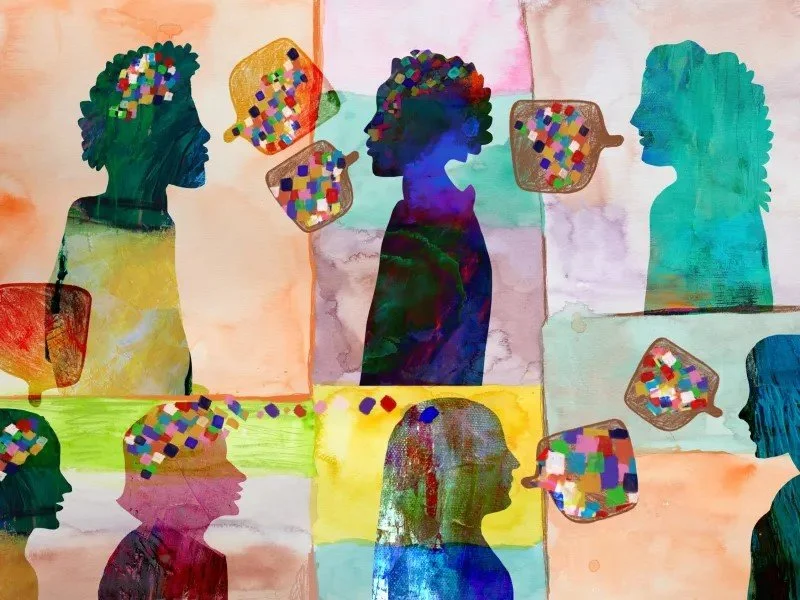3 Ways to Prevent Suicide Death
Credit: Stellalevi via Getty Images.
Word In Black’s health reporter shares three things she’s learned in the last three years of reporting to prevent suicide death.
By Anissa Durham
Every September, we mark National Suicide Prevention Month, and after nearly four years reporting on mental health in the Black community, I know we can’t afford to stop talking about it. I’ve also seen how dangerous the mix of misinformation, stigma, and sensationalized coverage can be — especially when the focus is on how someone died instead of how we stop it from happening.
I get it. I remember being a teenager when Netflix’s “13 Reasons Why” sparked a national conversation about suicide. Today, it doesn’t take much scrolling to find graphic images or videos of people harming themselves on social media. But for all the headlines and hashtags, too much about suicide — especially in Black and Brown communities — remains unsaid.
That silence is dangerous. Instead of glamorizing death or offering only thoughts and prayers, we need to ask a harder question: How do we actually prevent suicide death? That’s the question I’ve asked mental health journalists and experts. And it’s pushed me to dig deeper into why suicide has become a growing mental health crisis in many Black and Brown communities.
A Community in Crisis
In a 2023 report by the Centers for Disease Control and Prevention’s National Center for Health Statistics, between 2016 and 2020, Black people went to the emergency room due to suicidal ideation more than any other group. Clearly, folks in our community are struggling.
Last summer, the American Foundation for Suicide Prevention invited me to join its pilot ethical reporting committee. The goal is to assemble leading media experts to weigh in on coverage, collaborate on projects, and build connections across journalism. Earlier this year, I also co-wrote a course for the Poynter Institute to help journalists report on mental health in an ethical manner. It has been a rewarding experience to help educate both journalists and readers — even if the work sometimes feels small.
I’m passionate about mental health reporting. But gaps remain in how media covers suicide. Here are a few things I’ve learned we can do as a community to reduce suicide deaths in the Black community:
Acknowledge Black Americans are dying by suicide
I’ve interviewed mental health professionals, therapists, physicians, and advocates, and they all stress the same point: Suicide is preventable. But the first step is acknowledging that people in our community are struggling and often suffering in silence. Too often, suicide gets dismissed as a “white people problem.” The reality is it affects every age group — and while rates differ across demographics, there’s nothing to suggest you can’t be affected by it.
Here’s what you can do:
Know the warning signs: Pay attention to shifts in mood, withdrawal from family or friends, talk of hopelessness, or risky behavior. These can all be signals that someone is in crisis.
Engage in the community: Isolation fuels despair. Checking in on friends, neighbors, and loved ones — especially young people and elders — can help create the sense of community that protects against suicide.
Support health equity initiatives: Support initiatives that expand access to affordable, culturally competent mental health services. From advocating for more Black therapists to backing school-based programs, equity saves lives.
My loved one is expressing suicidal behavior, should I make the call?
A few years ago, I was out with a group of friends when I found myself in the middle of someone’s mental health crisis. This was before I became a health reporter and know what I know today. But nonetheless, a friend of mine, a relatively new one, was engaging in very risky behavior. At first, I didn’t think it was an issue until it became clear she was trying to end her life.
I won’t say how or what she did. But the point is, I kept asking myself and those around me if we should make the call. Do I call 911? Do I call 988, the suicide prevention hotline? While the other people in the group turned into makeshift social workers, something just didn’t sit right.
It was late, after midnight, and I was in a city I didn’t know well. If I called the police on a friend I hardly knew, would it do more harm than good? The group around me was all people of color, and a flood of questions ran through my mind: How would this play out? Would she be placed on a 5150 hold? Could we help her where we were? Would we get arrested?
Everyone tried to console her while I stepped back and tried to think strategically. I didn’t want my emotions to cloud my judgment — even though they did, and in the end we didn’t call for help.
The fear of the unknown and the idea that we could make things worse was in all of our minds. We were young men and women of color who were out drinking and dancing — how well would that have played out? I’ll never know.
I wish I had called.
As far as I know, she later got help, but that night stayed with me. I’m now hyperaware of behaviors that can lead to suicidal ideation or attempts, and I think of all the people I’ve known who hid their pain. So, I implore you to be braver than I was that night.
If you see someone suffering and talking about or attempting to end their life — make the call. In recent years, a number of states, including California where I live, operate mobile crisis teams. Instead of dispatching police officers to high stakes mental health crises, social workers and mental health professionals provide assessment and intervention. This has also reduced the rate of criminalization of Americans who experience a mental health crisis.
Normalize talking about mental health
There’s an incredible amount of stigma associated with mental health. Within the Black community, it’s common to dismiss mental health as something we can individually work through. But the reality is, in order to prevent suicide death, we have to normalize talking about mental health. It’s easy to get caught in the mentality of just pushing through the hard stuff and being that strong Black woman or strong Black man.
Nearly everyone at some point struggles with their mental health. Including you. This can look like stress, anxiety, depression, or suicidal thoughts. A simple way to start opening up about your own mental health or that of a loved one, is creating a safe non-judgmental environment. Maybe this looks like talking about certain challenges with a loved one over a cup of coffee or during a relaxing dinner.
It’s OK to ask questions, but how you frame them matters. Instead of saying, “How could you feel that way?” try, “Are there certain things that lead to those feelings?” Another good question is, “How can I best support you?” As a reporter, I’m always mindful of how I phrase questions so they aren’t invasive, while still seeking clarity and accuracy.
In interviews where the topic becomes a little heavier, I always offer my sources a break. I always emphasize that this is their story and if they are uncomfortable sharing certain details, that is OK. It’s always OK to stop.
However, if you are talking to someone and it becomes clear that they are in a dangerous or distressing situation — it’s always best to call for help. It’s always better to make decisions, even if they are difficult, that prioritize mental health safety. And when you normalize conversations on mental health, this in turn can help prevent suicide death.

